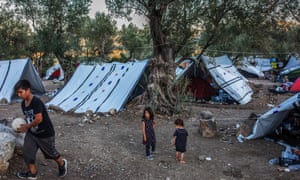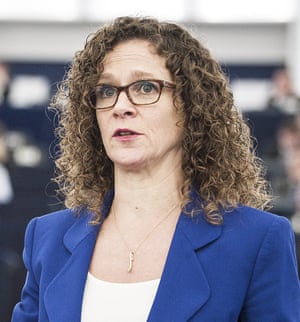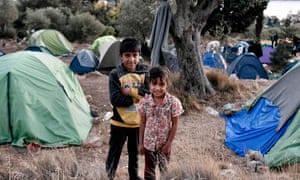Επιμέλεια: Ελένη Σοφού
(Για το ξενόγλωσσο αναγνωστικό κοινό του ιστολογίου)
UN envoy says EU policy during debt crisis had unintended consequences
(Για το ξενόγλωσσο αναγνωστικό κοινό του ιστολογίου)
UN envoy says EU policy during debt crisis had unintended consequences
Jennifer Rankin in Brussels and Helena Smith in Athens
A refugee camp on the Greek island of Lesbos. Photograph: Alessio Mamo for the Guardian
Greece’s asylum system is hamstrung by public sector cuts imposed during the country’s EU bailouts, a UN envoy has said, as campaigners warned of a looming winter crisis for refugees and migrants.
MEPs blame Europe’s asylum system for humanitarian conditions in Greece, where thousands are stranded in squalid camps that are a danger to physical and mental health.
Philippe Leclerc, the UN refugee agency’s representative in Athens, said EU policy on Greece during the debt crisis was “totally legitimate”, but pointed to unintended consequences for migration.
“It is a state that is affected by the consequences of the financial crisis and public control spending measures … [so] you have an emergency situation on the islands and the mainland, where the state is not fully equipped to respond.”
He was speaking to the Guardian days after the UNHCR called on Greece to take “urgent steps” to improve conditions for 11,000 people in dirty and unsafe camps on the islands of Samos and Lesbos.
Sophia in ‘t Veld: ‘This is happening under our noses.’ Photograph: Zuma/Rex
Senior European sources are appalled by the camps, especially Samos, where 4,000 people are living in wretched conditions at the Vathy reception centre, six times above capacity.
New arrivals are pitching flimsy tents on steep slopes around the camps and have no access to electricity, running water or lavatories. Inside the camps, broken toilets and showers mean that people live next to raw sewage. Camp dwellers also have to contend with snakes, and rats feeding on uncollected waste. “This is supposed to be the richest and most civilised continent in the world,” said the Dutch liberal MEP Sophie in ‘t Veld. “This is happening under our noses.”
EU officials think that Greek ministries are unable to coordinate or spend EU funds to help asylum seekers: the EU has allocated €1.6bn (about £1.4bn) since 2015, but at least €554m has not been spent by Greek authorities.
Brussels is suspicious that the defence ministry, which is led by Panos Kammenos of the nationalist right party Independent Greeks, is not prioritising the humanitarian needs of refugees. The ministry, one of the key government departments overseeing refugee camps, has been at the centre of alleged misspending EU funds, claims that it has rejected as “fake news”. The EU’s anti-fraud agency, Olaf, confirmed that it has “opened an investigation into alleged irregularities concerning the provisions of EU funded food for refugees”, but declined to comment further.
The EU is increasingly worried about a rise in arrivals in Greece, which is piling pressure on a system beset by delays. Greece is sheltering 67,100 refugees and migrants and has seen an abrupt surge in numbers crossing the land border with Turkey. The number of detections of illegal crossings at the northern land border has tripled, said Krzysztof Borowski, at the European Border and Coast Guard Agency (Frontex). “This is adding to pressure on Greece.”
Most making the treacherous journey across the fast-flowing Evros River separating the two nations are Turks fleeing political persecution. By October, registrations of Turkish nationals had jumped from 6,500 last year to 18,700, according to Frontex. Increasingly, Syrians and Iraqis have also joined the flows as word has spread that the land frontier is easier to cross.
As winter approaches, NGOs are warning of a crisis in the making. “There are around 400 people in the north still living in tents,” said Ruben Cano who heads the Athens branch of the International Federation of Red Cross and Red Crescent Societies. “The reception system in Greece is overwhelmed partly because the country is being made to shoulder too great a burden.”
The influx has put increasing strain on an asylum service labouring under severe fiscal constraint.
Refugees pose by their shelters on Samos. Photograph: Louisa Gouliamaki/AFP/Getty
“People are working under adverse conditions. There is clearly an issue of staff capacity that we need to resolve,” said Markos Karavias, director of the Greek asylum service.
Deep public sector cuts have contributed to Greece’s notoriously slow asylum procedures. Greece does not have enough judges to hear appeals, nor doctors and psychologists to carry out assessments of vulnerable claimants.
One consequence is that few asylum seekers and migrants are being returned to Turkey, a possibility created by a controversial EU deal with Ankara in 2016.
Brussels thinks that people-smugglers, aware of administrative shortcomings, are stepping up efforts to get people to Greece. “By not returning [from the islands to Turkey] you create a powerful marketing model [for smugglers],” said an EU source.
MEPs say it is wrong to blame Greece. The Dutch MEP in ‘t Veld blamed “the dysfunction of the council” – EU leaders and home affairs ministers – for the asylum system’s inadequacies.
EU member states remain deadlocked over a permanent system of refugee quotas, a dispute that threatens to delay a broader overhaul of the European asylum system, comprising seven laws.
Péter Niedermüller, a Hungarian centre-left MEP, thinks it unlikely that the legislation will be agreed before European elections in 2019.
“The whole refugee issue has been captured by the far-right political movements in Europe,” said Niedermüller, who led a European parliament delegation to Greece last year. “Italy, Austria, Poland and Hungary have nationalist anti-immigrant parties in government,” he added. “Many of the member states are not really ready to join a common European asylum policy and I think this is the problem.”
Since you're here…
… we have a small favour to ask. Three years ago we set out to make The Guardian sustainable by deepening our relationship with our readers. The same technologies that connected us with a global audience had also shifted advertising revenues away from news publishers. We decided to seek an approach that would allow us to keep our journalism open and accessible to everyone, regardless of where they live or what they can afford.
More than one million readers have now supported our independent, investigative journalism through contributions, membership or subscriptions, which has played such an important part in helping The Guardian overcome a perilous financial situation globally. We want to thank you for all of your support. But we have to maintain and build on that support for every year to come.
Sustained support from our readers enables us to continue pursuing difficult stories in challenging times of political upheaval, when factual reporting has never been more critical. The Guardian is editorially independent – our journalism is free from commercial bias and not influenced by billionaire owners, politicians or shareholders. No one edits our editor. No one steers our opinion. This is important because it enables us to give a voice to those less heard, challenge the powerful and hold them to account. Readers’ support means we can continue bringing The Guardian’s independent journalism to the world.
If everyone who reads our reporting, who likes it, helps to support it, our future would be much more secure. For as little as £1, you can support the Guardian – and it only takes a minute. Thank you.
Πηγή: https://www.theguardian.com



